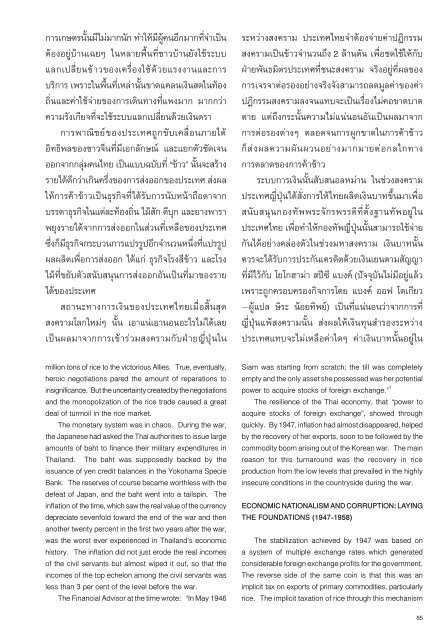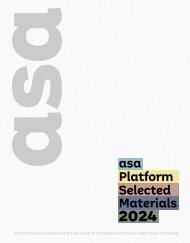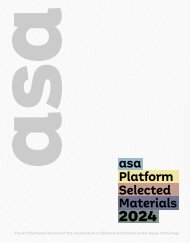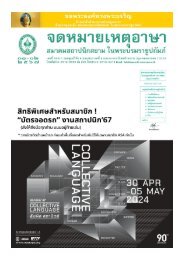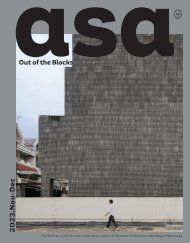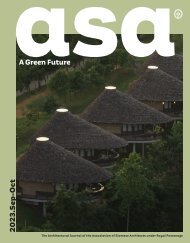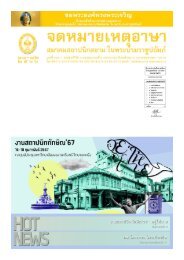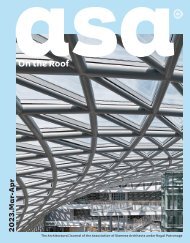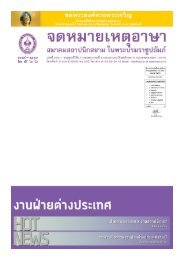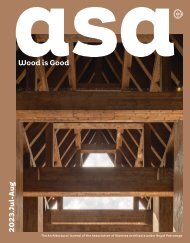บ้านเรือนถิ่นไทยในช่วงเจ็ดทศวรรษ 2489-2559
You also want an ePaper? Increase the reach of your titles
YUMPU automatically turns print PDFs into web optimized ePapers that Google loves.
่<br />
การเกษตรนั้นมีไม่มากนัก ทำให้มีผู้คนอีกมากที่จำเป็น<br />
ต้องอยู่บ้านเฉยๆ ในหลายพื้นที่ชาวบ้านยังใช้ระบบ<br />
แลกเปลี่ยนข้าวของเครื่องใช้ด้วยแรงงานและการ<br />
บริการ เพราะในพื้นที่เหล่านั้นขาดแคลนเงินสดในท้อง<br />
ถิ่นและค่าใช้จ่ายของการเดินทางที่แพงมาก มากกว่า<br />
ความรังเกียจที่จะใช้ระบบแลกเปลี่ยนด้วยเงินตรา<br />
การพาณิชย์ของประเทศถูกขับเคลื่อนภายใต้<br />
อิทธิพลของชาวจีนที่มีเอกลักษณ์ และแยกตัวชัดเจน<br />
ออกจากกลุ่มคนไทย เป็นแบบฉบับที่ “ข้าว” นั้นจะสร้าง<br />
รายได้ดีกว่าเกินครึ่งของการส่งออกของประเทศ ส่งผล<br />
ให้การค้าข้าวเป็นธุรกิจที่ได้รับการนับหน้าถือตาจาก<br />
บรรดาธุรกิจในแต่ละท้องถิ่น ไม้สัก ดีบุก และยางพารา<br />
พยุงรายได้จากการส่งออกในส่วนที ่เหลือของประเทศ<br />
ซึ่งก็มีธุรกิจกระบวนการแปรรูปอีกจำนวนหนึ่งที่แปรรูป<br />
ผลผลิตเพื่อการส่งออก ได้แก่ ธุรกิจโรงสีข้าว และโรง<br />
ไม้ที่ขยับตัวสนับสนุนการส่งออกอันเป็นที่มาของราย<br />
ได้ของประเทศ<br />
สถานะทางการเงินของประเทศไทยเมื่อสิ้นสุด<br />
สงครามโลกใหม่ๆ นั้น เอาแน่เอานอนอะไรไม่ได้เลย<br />
เป็นผลมาจากการเข้าร่วมสงครามกับฝ่ายญี่ปุ่นใน<br />
million tons of rice to the victorious Allies. True, eventually,<br />
heroic negotiations pared the amount of reparations to<br />
insignificance. But the uncertainty created by the negotiations<br />
and the monopolization of the rice trade caused a great<br />
deal of turmoil in the rice market.<br />
The monetary system was in chaos. During the war,<br />
the Japanese had asked the Thai authorities to issue large<br />
amounts of baht to finance their military expenditures in<br />
Thailand. The baht was supposedly backed by the<br />
issuance of yen credit balances in the Yokohama Specie<br />
Bank. The reserves of course became worthless with the<br />
defeat of Japan, and the baht went into a tailspin. The<br />
inflation of the time, which saw the real value of the currency<br />
depreciate sevenfold toward the end of the war and then<br />
another twenty percent in the first two years after the war,<br />
was the worst ever experienced in Thailand’s economic<br />
history. The inflation did not just erode the real incomes<br />
of the civil servants but almost wiped it out, so that the<br />
incomes of the top echelon among the civil servants was<br />
less than 3 per cent of the level before the war.<br />
The Financial Advisor at the time wrote: “In May 1946<br />
ระหว่างสงคราม ประเทศไทยจำต้องจ่ายค่าปฏิกรรม<br />
สงครามเป็นข้าวจำนวนถึง 2 ล้านตัน เพื่อชดใช้ให้กับ<br />
ฝ่ายพันธมิตรประเทศที่ชนะสงคราม จริงอยู่ที่ผลของ<br />
การเจรจาต่อรองอย่างจริงจังสามารถลดมูลค่าของค่า<br />
ปฏิกรรมสงครามลงจนแทบจะเป็นเรื่องไม่คอขาดบาด<br />
ตาย แต่ถึงกระนั้นความไม่แน่นอนอันเป็นผลมาจาก<br />
การต่อรองต่างๆ ตลอดจนการผูกขาดในการค้าข้าว<br />
ก็ส่งผลความผันผวนอย่างมากมายต่อกลไกทาง<br />
การตลาดของการค้าข้าว<br />
ระบบการเงินนั้นสับสนอลหม่าน ในช่วงสงคราม<br />
ประเทศญี่ปุ่นได้สั่งการให้ไทยผลิตเงินบาทขึ้นมาเพื่อ<br />
สนับสนุนกองทัพพระจักรพรรดิที่ตั ้งฐานทัพอยู่ใน<br />
ประเทศไทย เพื่อทำให้กองทัพญี่ปุ่นนั้นสามารถใช้จ่าย<br />
กันได้อย่างคล่องตัวในช่วงมหาสงคราม เงินบาทนั้น<br />
ควรจะได้รับการประกันเครดิตด้วยเงินเยนตามสัญญา<br />
ที่มีไว้กับ โยโกฮาม่า สปีซี แบงค์ (ปัจจุบันไม่มีอยู่แล้ว<br />
เพราะถูกครอบครองกิจการโดย แบงค์ ออฟ โตเกียว<br />
–ผู้แปล ษิระ น้อยทิพย์) เป็นที่แน่นอนว่าจากการที<br />
ญี่ปุ่นแพ้สงครามนั้น ส่งผลให้เงินทุนสำรองระหว่าง<br />
ประเทศแทบจะไม่เหลือค่าใดๆ ค่าเงินบาทนั้นอยู่ใน<br />
Siam was starting from scratch; the till was completely<br />
empty and the only asset she possessed was her potential<br />
power to acquire stocks of foreign exchange.” 1<br />
The resilience of the Thai economy, that “power to<br />
acquire stocks of foreign exchange”, showed through<br />
quickly. By 1947, inflation had almost disappeared, helped<br />
by the recovery of her exports, soon to be followed by the<br />
commodity boom arising out of the Korean war. The main<br />
reason for this turnaround was the recovery in rice<br />
production from the low levels that prevailed in the highly<br />
insecure conditions in the countryside during the war.<br />
ECONOMIC NATIONALISM AND CORRUPTION: LAYING<br />
THE FOUNDATIONS (1947-1958)<br />
The stabilization achieved by 1947 was based on<br />
a system of multiple exchange rates which generated<br />
considerable foreign exchange profits for the government.<br />
The reverse side of the same coin is that this was an<br />
implicit tax on exports of primary commodities, particularly<br />
rice. The implicit taxation of rice through this mechanism<br />
65


